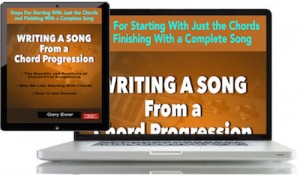In songwriting, as with all the arts, creating a legacy is a two-part formula. Part one is the writing of songs that are of consistently excellent quality, and part two is developing fame. Part one is arguably easier in the sense that that step need not require the involvement of others. But part two means needing to become famous for those songs, and that’s probably harder and requires involvement of others.
If you’re hoping to create a legacy, you’ve either got to become successful at getting famous singers or bands to perform your songs, or you’ve got to become famous as a performer of your own good music.
 If you like the chords-first songwriting method, you’ll want to read “Writing a Song From a Chord Progression.” It deals with the common chords-first problem of how to write a great melody straight from the chords. It’s part of “The Essential Secrets of Songwriting” 10-eBook Bundle.
If you like the chords-first songwriting method, you’ll want to read “Writing a Song From a Chord Progression.” It deals with the common chords-first problem of how to write a great melody straight from the chords. It’s part of “The Essential Secrets of Songwriting” 10-eBook Bundle.
Marketing your songs to others is tricky, and there is no one-size-fits-all process. One person may have success sending their songs to a publisher or manager, while others fall into success by simply having a strong online presence.
If you think you’re ready to have others hear and consider your songs for their own use, and hopefully to boost your own career, take a look at the suggestions in this article: “How to Get Recording Artists to Sing Your Song.” Be sure to check the “tips” section at the end of each article on that page. There are dangers to aggressively marketing yourself. Good marketing, like good songwriting, is an art. Also, register the copyright of any song you make available to others.
To start with, you need good songs. To quote producer David Foster, “A bad singer can have a hit with a great song… A great singer cannot have a hit with a bad song.”
So before you make an attempt to shop your songs around, be sure that you’ve got good material, and that you feel comfortable being asked to create more songs. No one in the industry is interested in someone who once wrote one good song. They want to know that you are consistently writing good songs, and that you can come up with lots more.
Consistency comes from having a solid grounding in the fundamentals of music in general, and songwriting in particular. So your best path forward for writing good songs involves:
- Developing your abilities to analyze songs to determine what makes them great.
- Developing your abilities to write great lyrics. Most songwriting legacies come from excellent lyrics more than any other song element.
- Developing a diverse songwriting style that allows you to move easily from one genre or sub-genre to another.
- Developing an ability to write relatively quickly. For your own use, there are no rules governing how long a good song should take, but the industry may want music from you in relatively short order.
If you think of the songwriters who have risen to the top of lists of the best in the industry, those who write excellent lyrics seem to have more staying power and renown than those who, let’s say, become known for their melodies. (McCartney is an exception: he writes great lyrics, but is arguably more known for the beauty and craft of his melodies.)
So practicing the writing of powerful, poignant lyrics with deep and relevant meaning is a good idea. But remember, the songwriting industry won’t be tolerant of songs that are weak in any way. So marketing your songs because they have great lyrics, but weak everything else, won’t work.
Consistency is the most important characteristic of the professional songwriter. If you can write lots of strong songs that others love to perform, you’re ready.
 Written by Gary Ewer. Follow Gary on Twitter.
Written by Gary Ewer. Follow Gary on Twitter.
 If you’re trying to improve your songwriting skills, you need basic grounding in the fundamentals. That’s what you get with “The Essential Secrets of Songwriting 10-eBook Bundle.” Right now, get a copy of “Use Your Words! Developing a Lyrics-First Songwriting Process” FREE when you get the Bundle.
If you’re trying to improve your songwriting skills, you need basic grounding in the fundamentals. That’s what you get with “The Essential Secrets of Songwriting 10-eBook Bundle.” Right now, get a copy of “Use Your Words! Developing a Lyrics-First Songwriting Process” FREE when you get the Bundle.










